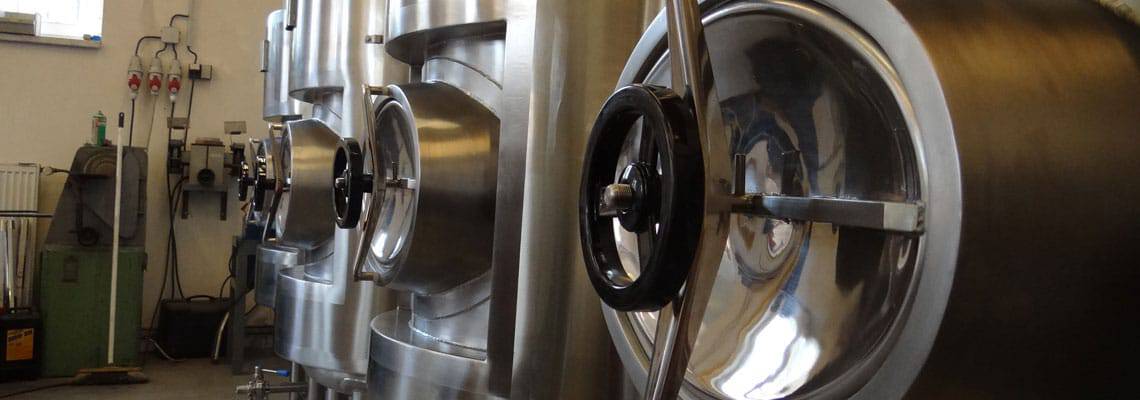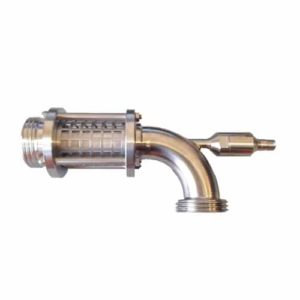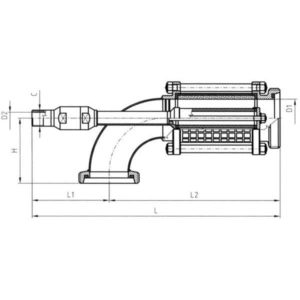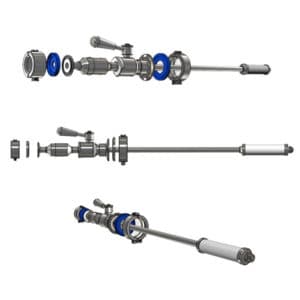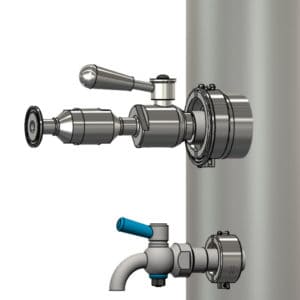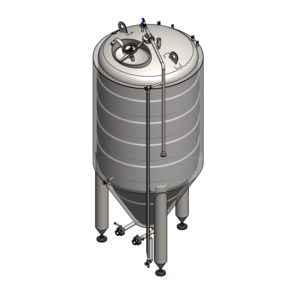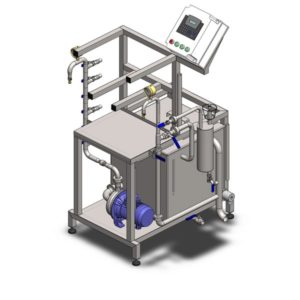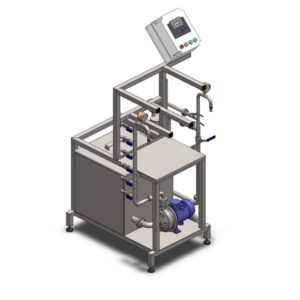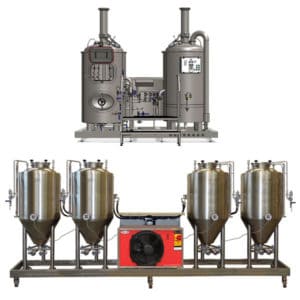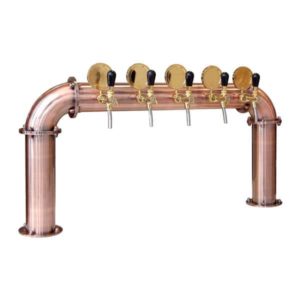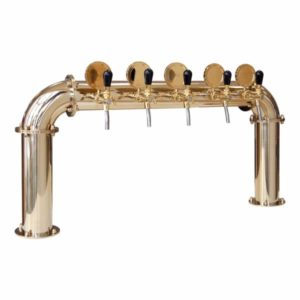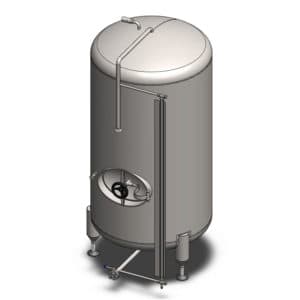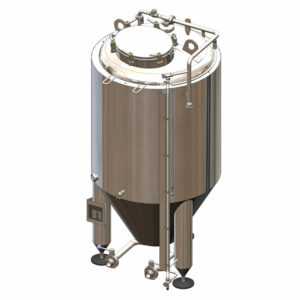Description
The combi multifunction Maturation lager tank & Bright beer tank (called also Lager tank, Secondary fermentation tank, Beer pressure tank, Lagering tank, Pressure fermenter) with a vertical construction, without insulation, cooled by air from outside, with usable volume 250 liters and total volume 290 liters, that is designed to secondary fermentation (maturation process) of the alcoholic beverage products, storage, tapping, carbonation, filtration of beer, cider, wine and other beverages under pressure, and also for preparation of beverages before their bottling or filling into kegs in several variants, made of stainless food steel DIN 1.4301 (AISI 304). The vessel is manufactured containing standardized dimensions and equipment, or according to individual customer requirements. The tank is normally available in several versions (optional dimensions, quality class, maximum pressure). Classic design. PED certificate (optional also GUM, GOST). All parts are made in European Union.
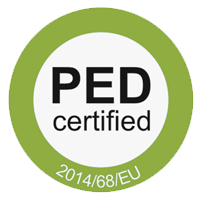 The pressure tank is fully manufactured in accordance with European Standards EN 13445 and PED 2014/68/EU. The PED certificate (and all documents related with the pressure equipment in accordance with PED 2014/68/EU standard) is not included in price of the tank and for use the tank in European countries it is necessary to add the item “PED 2014/68/EU certificate” .
The pressure tank is fully manufactured in accordance with European Standards EN 13445 and PED 2014/68/EU. The PED certificate (and all documents related with the pressure equipment in accordance with PED 2014/68/EU standard) is not included in price of the tank and for use the tank in European countries it is necessary to add the item “PED 2014/68/EU certificate” .
Equipment of the Maturation Beer Tank Classic 250/290 liters
Assembly drawing of the maturation beer tank (model 2015 / SQ / standard dimensions) :
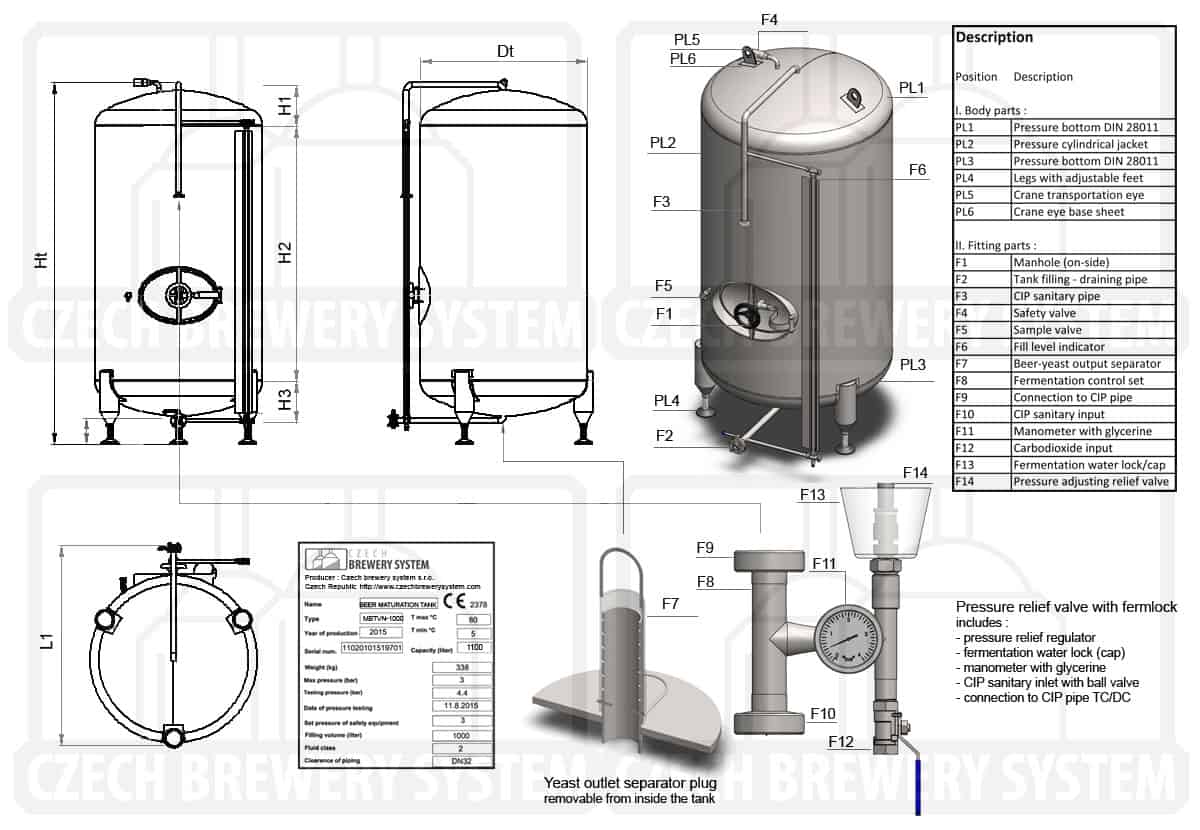
MBTVN-250C - Technical parameters
Technical parameters of the MBTVN-250C : The cylindrical fermenter for fermentation and maturation of beer or cider, usable volume 250 liters, without insulation, cooled by air, with vertical orientation.MBTVN-250C equipment and parameters | Standard quality without PED | Standard quality with PED | High quality without PED | High quality with PED |
|---|---|---|---|---|
Parameters (standard dimensions) | SQ no-PED | SQ PED | HQ no-PED | HQ PED |
| Vu Usable volume [liters] | 250 | 250 | 250 | 250 |
| Vt Total volume [liters] | 290 | 290 | 290 | 290 |
| V1 Upper arched bottom - volume [liters] | 25 | 25 | 25 | 25 |
| V2 Cylindrical part - volume [liters] | 240 | 240 | 240 | 240 |
| V3 Lower arched bottom - volume [liters] | 25 | 25 | 25 | 25 |
| L1 Total tank width [mm] | 800 | 800 | 800 | 800 |
| Dt Outer tank diameter [mm] | 600 | 600 | 600 | 600 |
| Ht Total height [mm] | 1496 | 1496 | 1496 | 1496 |
| H1 Upper bottom height [mm] | 128 | 128 | 128 | 128 |
| H2 Cylindrical part - height [mm] | 850 | 850 | 850 | 850 |
| H3 Lower bottom height [mm] | 128 | 128 | 128 | 128 |
| Mn Weight netto [kg] | 140 | 140 | 140 | 140 |
| Mb Weight brutto [kg] | 431 | 431 | 431 | 431 |
Equipment standard | SQ no-PED | SQ PED | HQ no-PED | HQ PED |
| Pressure range (allowed by PED) | 0.0 - 0.5 bar | 0.0 - 3.0 bar | 0.0 - 0.5 bar | 0.0 - 3.0 bar |
| Testing pressure range (tested by producer) | 0.0 - 4.4 bar | 0.0 - 4.4 bar | 0.0 - 4.4 bar | 0.0 - 4.4 bar |
| PED 2014/68/EU certificate | N/A | included | N/A | included |
| Material (Origin in Europe) | AISI 304 | AISI 304 | AISI 304 | AISI 304 |
| Inner surface – upper bottom + cylinder | 2B / Ra≤0.8µm grinded | 2B / Ra≤0.8µm grinded | 2C / Ra≤0.5µm polished | 2C / Ra≤0.5µm polished |
| Outer surface | 2B grinded | 2B grinded | 2B grinded | 2B grinded |
| External sheets - joints | riveted / welded | riveted / welded | all welded | all welded |
| PUR insulation | N/A | N/A | N/A | N/A |
| CT / CJ1 Cooling duplicator on cylinder - in/out welded with G-thread | N/A | N/A | N/A | N/A |
| Transport hinges | N/A | N/A | N/A | N/A |
| Upper service door (manhole) | 420x340mm open inside | PED 420x340mm open inside | 420x340mm open outside | PED 420x340mm open outside |
| Side service door (manhole) | N/A | N/A | N/A | N/A |
| Ovepressure/vacuum safety valve | Max 0.5 / 0.2 bar | Max 3.2 / 0.2 bar | Max 0.5 / 0.2 bar | Max 3.2 / 0.2 bar |
| Bottom filling-draining armature | DN25 DC/TC | DN25 DC/TC | DN25 DC/TC | DN25 DC/TC |
| Sample valve | DN10 sanit | DN10 sanit | DN10 sanit | DN10 sanit |
| CIP and manometer connection fittings | DN25DC/TC | DN25DC/TC | DN25DC/TC | DN25DC/TC |
| Venting valve | included | included | included | included |
| Sanitizing ball-shower | static | static | rotational | rotational |
| Filling level indicator fixed | included | included | optional | optional |
| Filling level indicator removable | optional | optional | included | included |
| Thermosensor socket | N/A | N/A | N/A | N/A |
| Ladder eyes | N/A | N/A | N/A | N/A |
| Rubber adjustable feet | 3 pcs | 3 pcs | 3 pcs | 3 pcs |
| Type label - tank parameters PED | non-PED | included | non-PED | included |
| Minimum operating temperature | -15 °C | -15 °C | -15 °C | -15 °C |
| Maximum operating temperature | +80 °C | +80 °C | +80 °C | +80 °C |
| Guaranteed number of pressure cycles (for max. pressure) | 500 | 500 | 500 | 500 |
| Standard warranty | 2 years | 2 years | 3 years | 3 years |
Special equipment maturation lager beer tanks | SQ no-PED | SQ PED | HQ no-PED | HQ PED |
| Manometer with glycerine | included | included | included | included |
| Fermentation cap-lock with a pressure fine-adjusting valve | included | included | included | included |
| Pressure fine-adjusting valve without the fermentation lock | € 100 | € 100 | € 100 | € 100 |
| Removable yeast separator for the drain pipe | included | included | included | included |
Equipment optional - surcharge | SQ no-PED | SQ PED | HQ no-PED | HQ PED |
| Side service door (manhole) | N/A | N/A | N/A | N/A |
| Upper service door (manhole) | included | included | included | included |
| Upper service door with a sight window | € 462 | € 462 | € 462 | € 462 |
| Upper service door fully-glass | € 692 | € 692 | € 692 | € 692 |
| Ladder | N/A | N/A | N/A | N/A |
| Side universal armature for hopgun, carbonization, filtration, flotation | € 38 | € 38 | € 38 | € 38 |
| Upper special armature-set for a dry hopping | € 192 | € 192 | € 192 | € 192 |
| Carbonization stone | € 423 | € 423 | € 423 | € 423 |
| Sanitizing ball-shower - rotational | € 56 | € 56 | included | included |
| Scale on the pressure adjusting valve | € 115 | € 115 | € 115 | € 115 |
| Scale for Filling level indicator mm | € 194 | € 194 | € 194 | € 194 |
| Temperature measuring and control system | external air cooler | external air cooler | external air cooler | external air cooler |
| Foam compensator for Sample valve | € 103 | € 103 | € 103 | € 103 |
| Non-standard dimensions of the tank by customer | 10% and more | 10% and more | 10% and more | 10% and more |
| Customized equipment of no-PED tank | € 179 | € 179 | € 179 | € 179 |
| Non-standard equipment of PED tank | € 1 063 | € 1 063 | € 1 063 | € 1 063 |
Legend :
N/A = Not available
DC = Dairy Coupling DIN 11851, TC = TriClamp DIN 32676 (type of the coupling depends on requirement of a customer)
PED = Certification for pressure vessels required in all EU countries – the EU Directive PED 2014/68/EU Pressure Equipment
The manufacturer reserves the right to change the parameters according to the current availability of materials and fittings. A customer will always receive our production drawing for approval before manufacturing the ordered tank.
Standard equipment – description
- Adjustable pressure valve with a manometer and fermentation lock – A special armature that is designed especially to controlled fermentation and maturation of the beer (or sparkline wine or cider) under accurate set pressure.
- Separator of sedimented yeast – a special removable short pipe that is designed to easy separation of yeast under a bottom from clear product above the yeast layer
- Outer jacket of the tank of stainless steel – Kind of the surface finishing (standard = grinded) choosed by customer.
- Guaranteed inner surface roughness : Ra < 0.8 μm or less (grinded surfaces) / Ra < 0.5 μm or less (polished surfaces)
- Service door (manhole) on the upper arched bottom or on-site on the cylinder part, according to customer requirements (SQ = open inside / HQ = open outside)
- Bottom filling/emptying armature – The inlet / outlet pipe with a butterfly valve for filling tank, discharging of yeast and draining of full content of the tank
- Sanitizing ball-shower – CIP sanitizing ball-shower (SQ = statical / HQ = rotational) – one or more pcs
- Sanitation pipe – a multifunction pipe with a ball valve for connection of a sprayball, CIP station (cleaning, sanitizing), the adjustable pressure valve with manometer, CO2 inlet
- Sample valve – cleanable and sanitizable sampling cock for collection product samples
- Safety valve – double-acting overpressure (standard = 3.2 bar) and vaccum protection (0.2 bar) safety valve – only pressure version of the tank
- Venting valve – dedicated valve for safety draining of the tank and for accurate measuring of pressure in the tank with manometer (when the shower ball shower is blocked with a foam)
- Manometer – It is included in the set of the adjustable pressure valve. Made of stainless steel, with glycerine inside.
- Filling level indicator – cleanable and sanitizable glass pipe for visualisation of product level in the tank (SQ = fixed / HQ = removable)
- Transport hinges – steel welded hinges for safety transport of the tank with crane or forklift
- Adjustable feet – 3 or 4 legs with rubber feet for accurate adjusting of the tank on an uneven floor
- Type label – the steel label with all parameters that are required from European Union for pressure vessels
- PED 2014/68/EU – certificate – the European certificate for the overpressure vessel + document for archiving history of the pressure vessel
Optional equipment – description
- Adjustable pressure valve without fermentation lock – Simplified mechanism to accurate setting of pressure designed for this type of beverage production tanks with a glycerine manometer (standard range from 0 bar up to 3 bar ) – necessary for keeping beer under pressure during all operations with the tank – in this maturation beer tank the adjustable pressure valve with the fermentation lock fully ensures this function.
- Special doors – manholes – secondary site manhole, manhole with sightglass, manhole with glass door
- Special cleaning-sanitizing ball-showers – rotational, pulse or other special cleaning equipment for extreme effective cleaning of the tank
- Side or upper universal armature – Universal multi-use armature for connection of the flotation equipment, carbonization stone or the hop extractor for dry hopping.
- Scale for the filling level indicator – a liter scale on a cover of the filling level indicator for visualization of the current product volume in the tank
- Scale for the adjustable pressure valve – a bar scale on a adjustable pressure valve screw for indication of just required pressure in the tank (a manometer shows the current pressure)
- Temperature measurement and regulation components – we deliver several types of thermosensors, thermometers and also fully equipped temperature control systems for our tanks
- Carbonization stone – the special porous stone for carbonization of beverages from CO2 bottles
- Ladder – for easy operating with manholes and other upper accessories of tanks
- Tank product filling hub – a special tool to easy filling of product (like beer wort , cider must) to the fermentation tank
- Stirring equipment – to stirring contents of the tank, It is mounted on the side of the tank shell
- Other customizations of the tank – according on customer´s requirements – non-standard dimensions, special armatures, special surface and design of the tank etc.
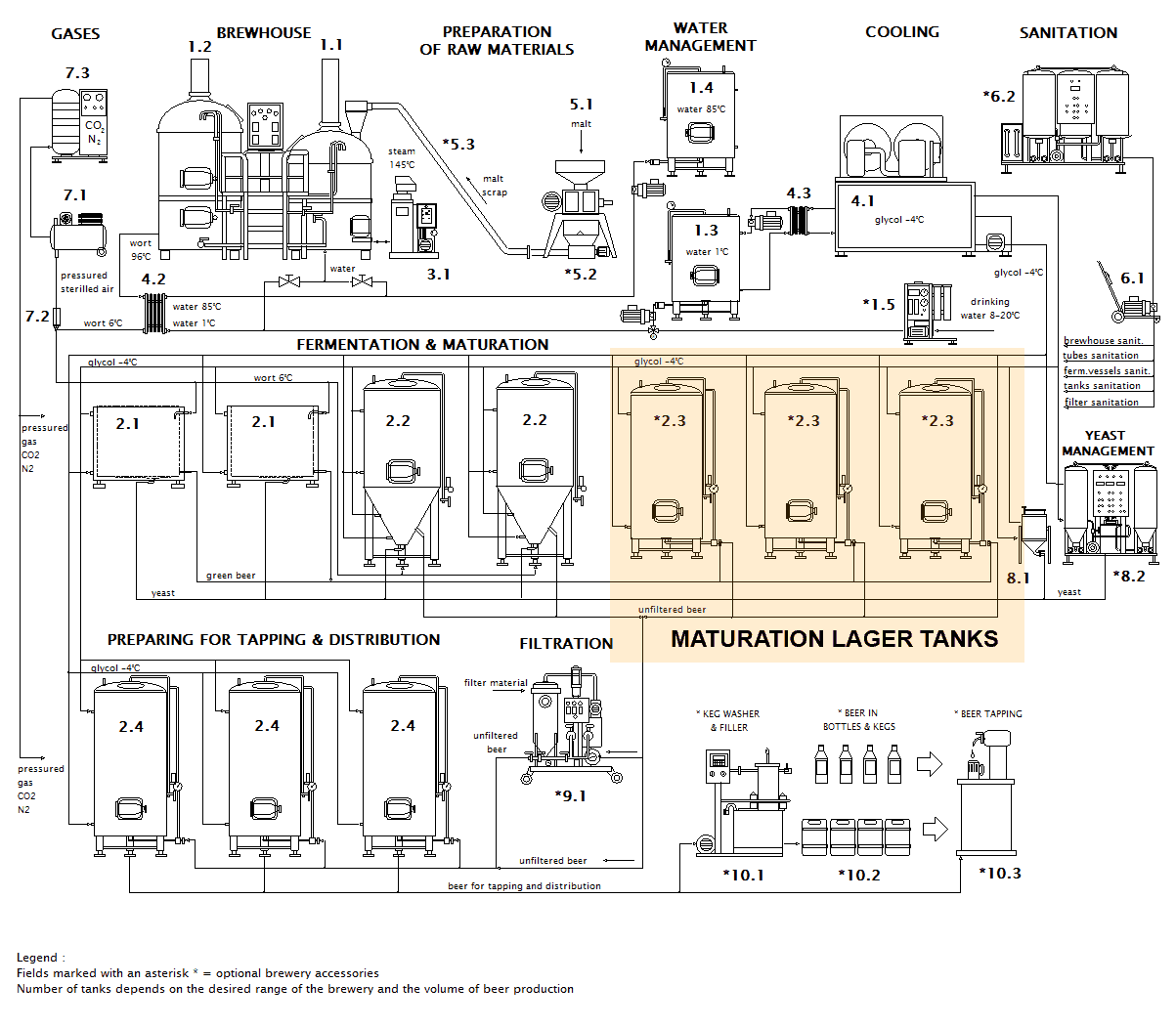
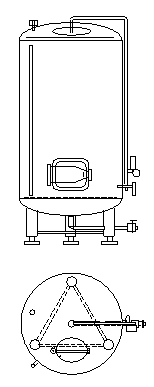 About the cylindrical storage tanks cooled by air
About the cylindrical storage tanks cooled by air
… in comparation with the beer maturation tanks cooled by water or glycol
These beer maturation tanks – lager tanks have an easiest construction and so it is possible to buy them for the lowest price. These tanks are in single-jacketed version without any cooling channels. Tanks have to be placed in insulated chilled room or chilled box, where the space is cooled by air cooling unit. Their advanatage is their low purchase cost. And their disadvantage is that the temperature in each tank cannot be regulated regardless of the other tanks and the human operating comfort is lower because opertors work in cold and humid surroundings. The electric consumption is higher when tanks are cooled with air and not with the liquid. However, this type of the beverage-production tank is used the most in restaurants because of the investment savings.
The vertical orientation of cylindrical tanks has a many practical advantages:
- Effective sanitation of whole tank using only one ball-washer (cost savings).
- Very easy manual cleaning of the inner and outer side of the tank – usually it is possible to stand in the inside of the tank and it is possible to walk around the tank.
- Smaller floor-space requirements, effective usage of vertical room space.
- Easy manipulation and access to all armatures and functional parts of the tank.
- Precise tracking of product quantity in a tank using a filling level indicator.
I. Dimensional variability of the maturation tank MBTVN-250 liters :
We produce the beer maturation tanks and the tanks for storage pure beer with volume 250 liters in five production lines according to the ratio of the height and diameter of the container. It is advantage for customers, because variable dimensions of tanks is often necessary to adapt for limited space dispositions. Possible dimensions variants :
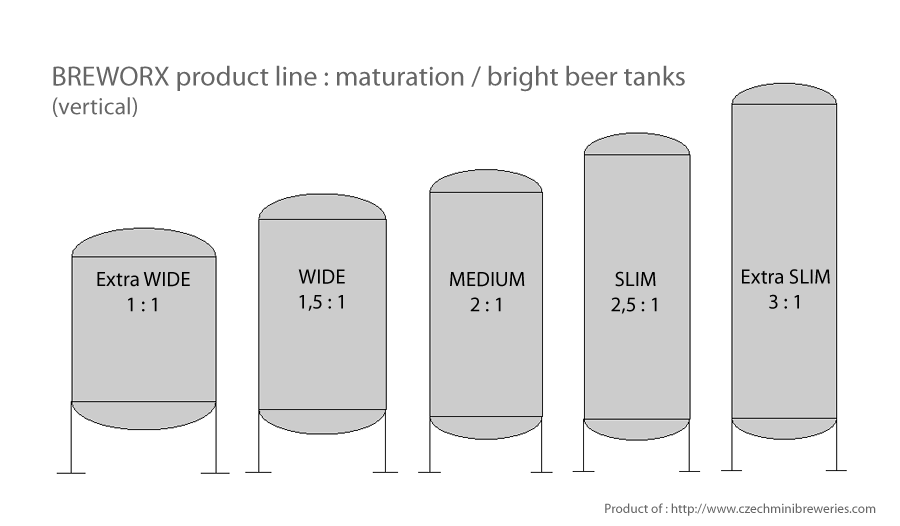
In this eshop we describe only a standard variant of the tank for storage pure beer with useful volume 250 liters. If you want another variant, send us your request and we will send you an individual quote for the tank.
Variations of the maturation tank MBTVN-250 liters according to its overpressure limit :
- Medium-pressure cylindrical vessel 250 liters – The maximum available overpressure is 3.0 bar, includes PED certificate for pressure vessels – the container can be used as pressure bright beer tank for tapping of beverages into kegs or bottles, filtration and drafting of beer or cider with manual or automatic fillers.
- High-pressure cylindrical vessel 250 liters – We can produce also the tank equipped with valves for higher overpressure than 3.0 bar – we will prepare an individual offer for the special variants of tank.
Variations of the maturation tank MBTVN-250 liters according to its quality and equipment :
According to quality requirements and financial possibilities of customers we recognize the cylindrical pressure tanks and bright beer tanks with three classes of quality and equipment:
- HQ – High quality – High quality workmanship of all parts, welded joints and surfaces. The inner surface has a guaranteed roughness Ra<0.5 μm – glossy design. The outer surface is unified. All functional armatures and fittings that have an impact on the reliability and safety of the products are made in Europe or in the USA. Luxury equipment of the tanks. The main advantages are the savings of sanitizing solutions, water and energy, minimized losses of beverages, shorter work time, reduction of production costs. Three years warranty for stainless steel main parts and also for the fittings. The quality class for the most demanding customers.
- SQ – Standard quality – Standard quality workmanship of all parts, welded joints and surfaces. All functional armatures and fittings that have an impact on the reliability and safety of the products are purchased from approved suppliers from Europe or USA. Inspection of all critical welds and joints. The inner surface has a guaranteed roughness Ra<0.8μm – grinded design. Usual equipment af the vessels, usual set of fittings. Tanks in this quality class comply with all European regulations for pressure vessels and food processing plants. Two years warranty for stainless steel main parts, two year for the fittings. It is the most often ordered quality variation of tanks for our customers.
- LQ – Lower quality – Lower quality workmanship of all parts, welded joints and surfaces. The most of functional armatures and fittings are purchased from approved suppliers from Asia. The inner and outer surface are not unified. Not guaranteed surface roughness on the inside of the containers. This solution is interesting only for starting small breweries because it saves an investition costs. Unfortunatelly, this brings higher beverage production costs. Longer period of sanitation, greater consumption of the sanitizing solution, energy, labor and hot water. High losses of produced beverages. We don´t offer this quality class for our products, because the equipment with the LQ quality class does not comply with the European regulations for pressure vessels and food processing plants. It is the quality of tanks of very cheap world producers of the tanks.
Our quality declaration: Why should you buy this type of the tank just from us?
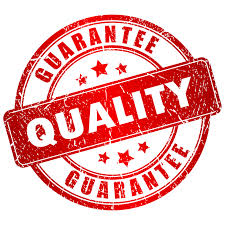
- We design, manufacture, weld, mount and test of all vessels (excluding non-pressure vessels) in accordance with the strict European standards and guidelines for pressure vessels (EU Directive PED 2014/68/EU Pressure Equipment). I.e :
- Each pressure vessel contains a double-acting air vent valve (prevents against an over pressurization or implosion of the tank during its charging / discharging)
- Each pressure vessel also contains an independent overpressure safety valve (prevents against a very dangerous overpressurization of the vessel and the subsequent explosion during a malfunction or insufficient capacity of the double acting air vent valve)
- Each pressure vessel is designed by certified designer who is qualified for the designing and calculation of pressure vessels.
- Production documentation for each pressure vessel containing static strength calculation, the exact description of a right manufacturing process, including the required types of welds, thickness of material, critical points solutions.
- All the manufactured pressure vessels are subjected to rigorous testing of tightness and porosity of welds, using a special liquid that detects even the slightest unwanted leaks, pores or micro-cracks = The Penetration Test
- Pressure vessels are tested at overpressure which is at least 1 bar higher than the overpressure, for which containers are certified.
- The Protocol on the tightness and pressure tests and the EU declaration of conformity are issued to all pressure vessels. We also attach the Document of pressure tank history., at the request of the customer.
- Manufacturing processes, design drawings, manufacturing, tightness and pressure tests are supervised by an inspector of TÜV SÜD Czech or another certified company, supplying quality control and compliance with European standards.
- Each pressure vessel contains an indelible nameplate with the obligatory name of the manufacturer, the ultimate pressure or other data that uniquely identifies the concrete pressure vessel in accordance with EU PED 2014/68/EU
- We produce food containers fundamentally from food-friendly stainless steel that fully comply with the Regulation of the European Parliament and Council Regulation EC no. 1935/2004. These materials do not release their constituents to food in quantities which could endanger human health or bring about an unacceptable changes in the composition of food or a deterioration in their organoleptic and sensory characteristics in contact with food under normal or foreseeable conditions. We do not use cheap stainless steel with lower quality, which will soon lose their corrosion resistance and inactivity to food, especially after repeated contact with aggresive solutions during the cleaning and sanitizing process.
- We are looking into suppliers of construction and installation materials and components from which we produce equipment for food production and handling. We do not buy any material from importers who are unable to prove its European origins and characteristics.
- All the tanks, which we design for maturation, maturation and storage of beverages, have optimized dimensions for the maturation processes, maturation process, carbonation, carried out in accordance with technological standards for beverages production. We never determine the dimensions of the tanks only by estimate .
- All tanks that are made in SQ/HQ quality class, are produced with the guaranteed inner surface roughness of Ra < 0.8 microns or less , which is the European standard prescribed roughness of the inner surfaces of the tanks that come into contact with food and sanitation alkalic and acid solutions. Guaranteed roughness of the inner surface of the vessel is extremely important to ensure thorough cleaning and sanitation tanks. This is an essential prerequisite for achieving purity and sterility of food production equipment. We repeatedly do measurements of all internal surfaces of tanks with the special roughness-meter TR-130 during all their manufacturing process. We polish the inner surface of the tank until the desired roughness is reached.
- Each container is designed and manufactured in such a way as to ensure easy cleaning and sanitizing of all surfaces that come into contact with food. Therefore, the vessels are equipped with at least one sanitation shower, removable and sanitizable fill level-indicators and sampling cocks. We do not use any cheap armatures, for which the manufacturer has failed to sanitary design and cleanability.
- Tanks have an united outer surface. All joints of the outer sheets (thickness at least 2 mm) are either welded or completely sealed. This is important to prevent ingress of moisture into the double casing, moistening the insulating material and the loss of insulating ability. This ensures a consistent quality and insulating capacity of the tanks. For containers in SQ quality the external sheets are usually riveted and they have a thickness of at least 1 mm.
- We isolate all the pressure vessels by quality PUR foam. The insulating polyuretan foam is professionally applied to the insulating space of the tanks so as to avoid formation of thermal bridges, unisolated empty space or deformation of tanks. We do not use cheap little functional replacements for the isolation of the tanks such as insulating wool, polystyrene beads, inexpertly applied foam.
- Diameters of nozzles, valves and piping are sized correctly according to the volume and vessel function – we do not mount underpowered functional elements on the tanks.
- The warranty for the tanks produced in HQ is 36 months. The warranty on tank in SQ quality is 24 months. The practical life of the tanks is usually several decades, while elements with lower lifetime (valves, seals, etc.) can usually to be easily replaced with a new standardized elements of the same or another manufacturer.


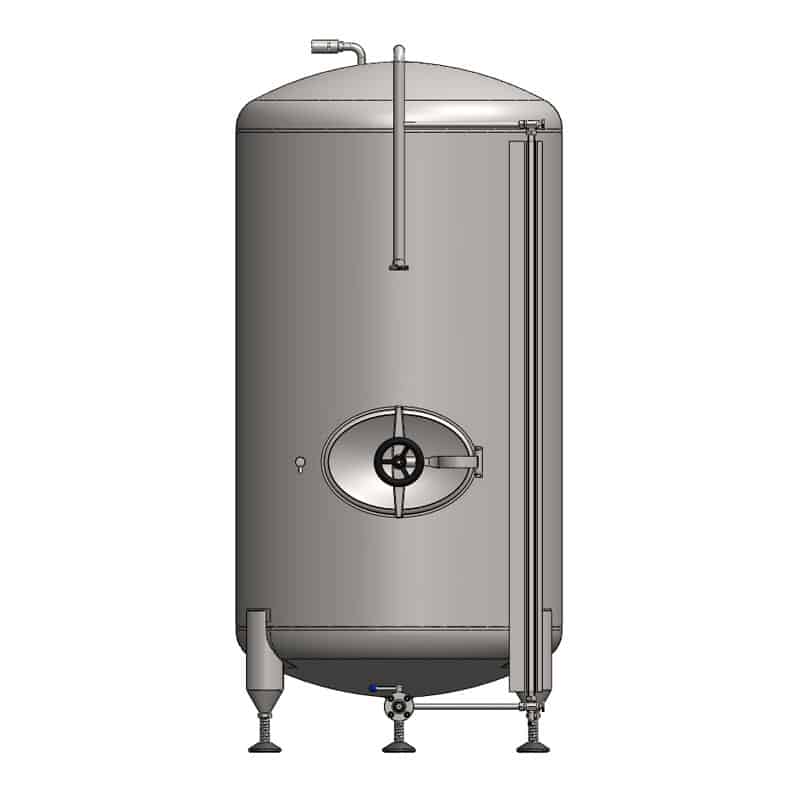
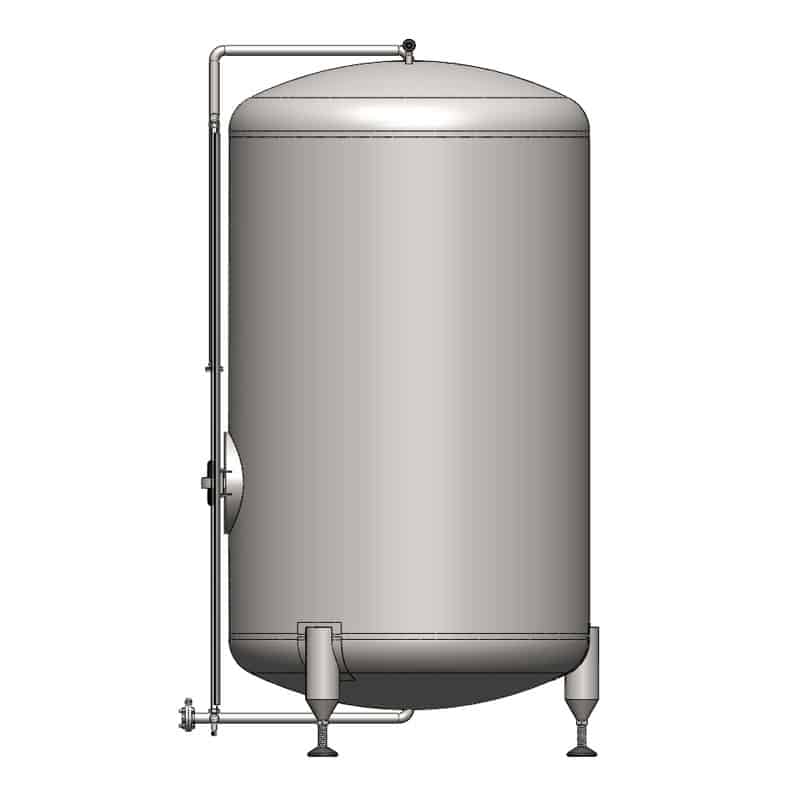
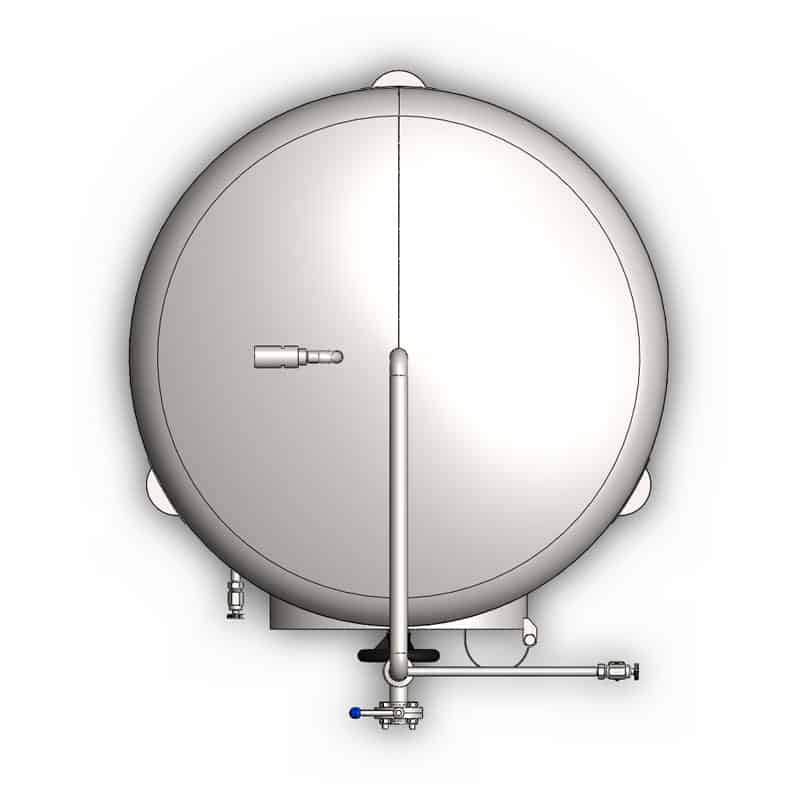
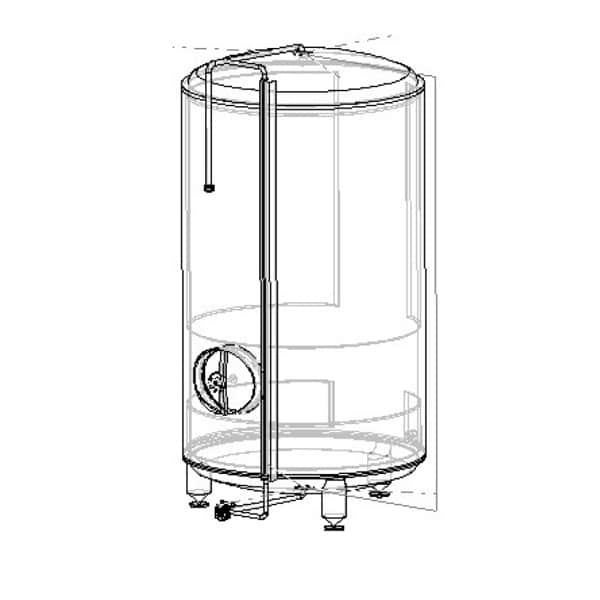
 The pressure tank is fully manufactured in accordance with European Standards EN 13445 and PED 2014/68/EU. The PED certificate (and all documents related with the pressure equipment in accordance with PED 2014/68/EU standard) is not included in price of the tank and for use the tank in European countries it is necessary to add the item “
The pressure tank is fully manufactured in accordance with European Standards EN 13445 and PED 2014/68/EU. The PED certificate (and all documents related with the pressure equipment in accordance with PED 2014/68/EU standard) is not included in price of the tank and for use the tank in European countries it is necessary to add the item “
